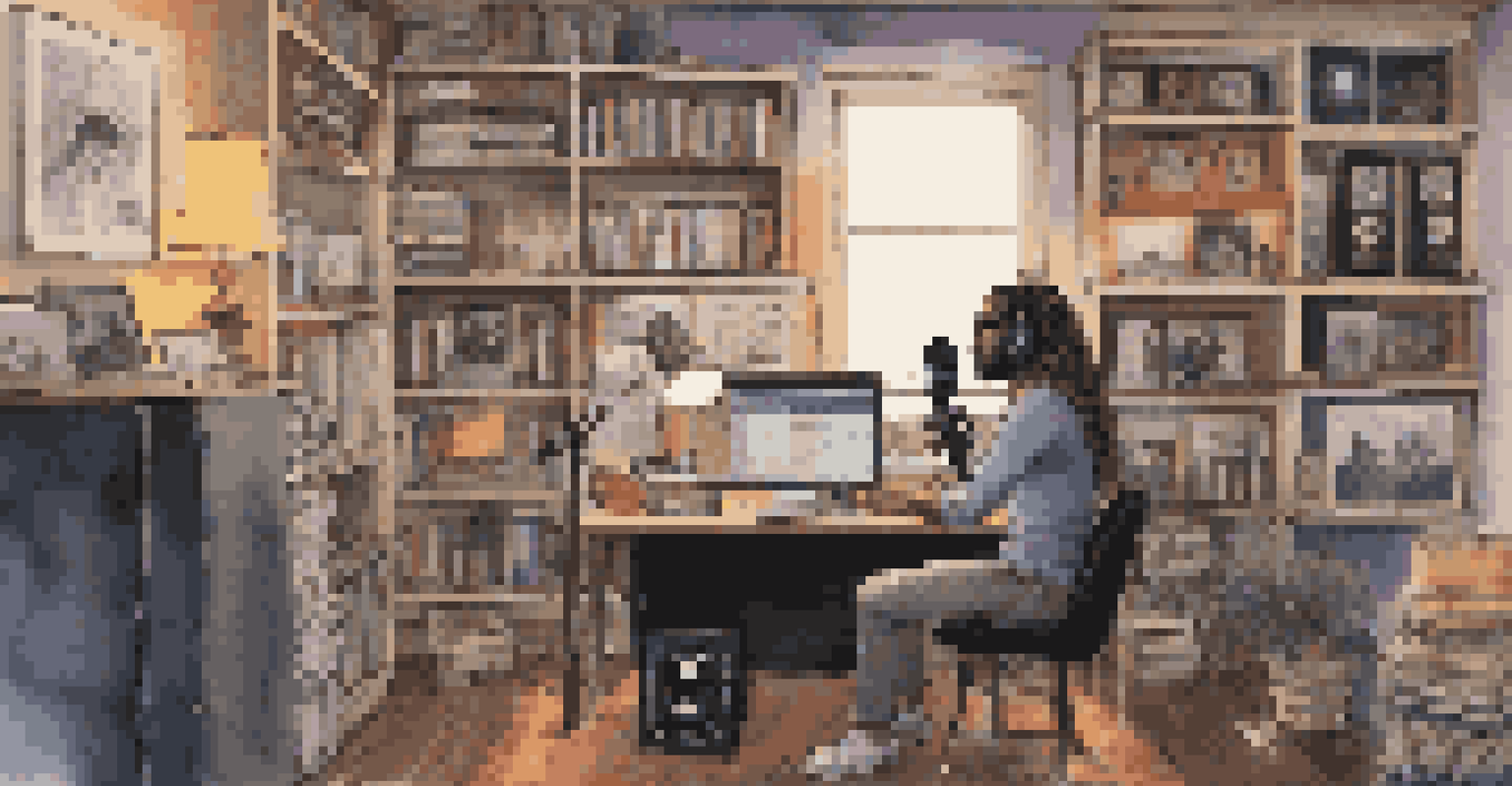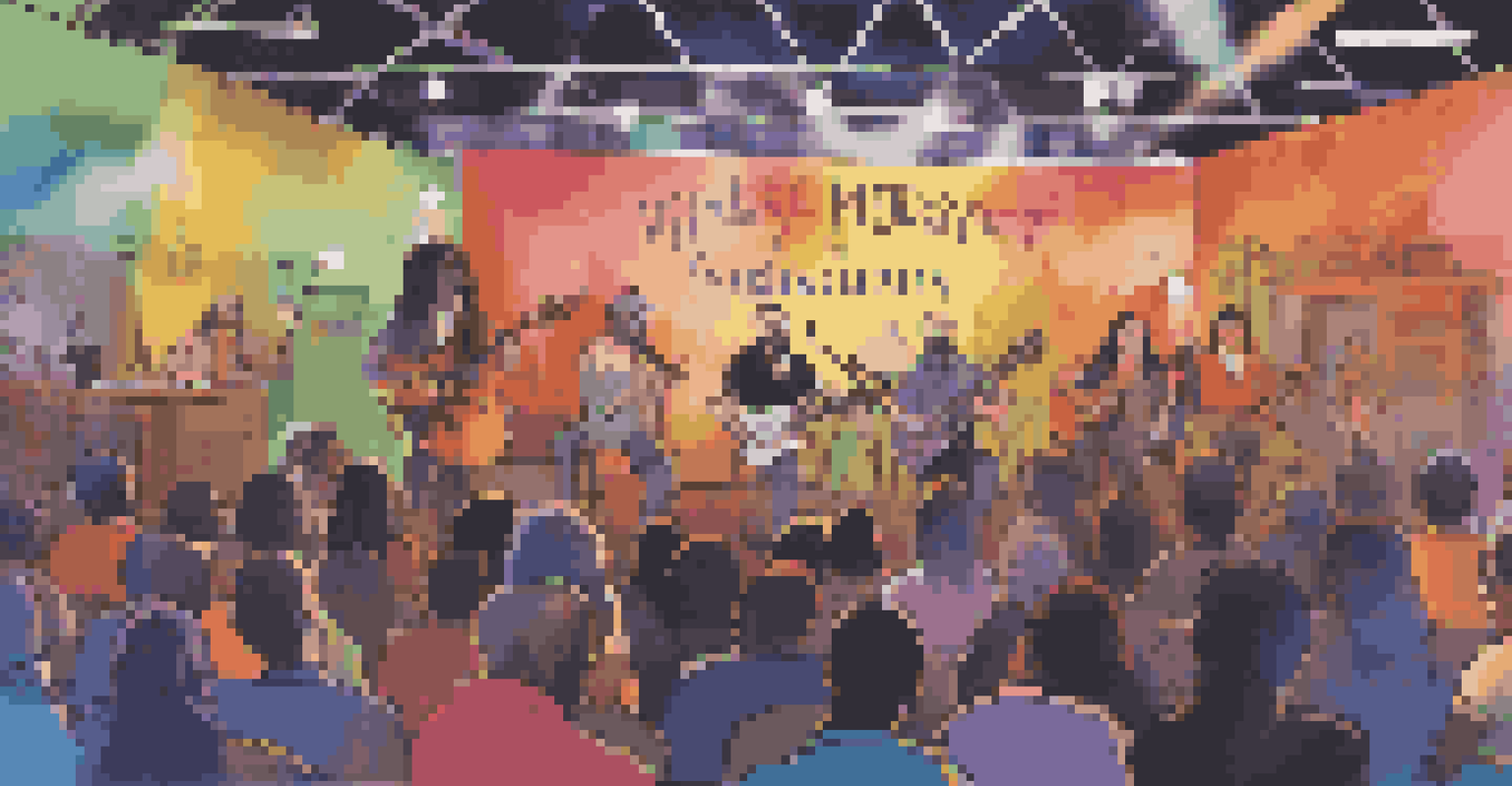The Role of Podcasting in the Music Industry's Revenue Model

The Rise of Podcasting: A New Frontier for Music
Podcasting has surged in popularity, creating an exciting new platform for music artists. With millions of listeners tuning in, musicians can share their stories, thoughts, and even new tracks in a more personal way. This medium allows for deeper engagement, as fans feel a connection through the artist's voice and narrative. As a result, podcasting is becoming an essential tool in building a loyal fan base.
Podcasting is a great way to build a relationship with your audience. It’s an opportunity to connect with them on a deeper level and share your journey.
Many artists are now leveraging podcasts to showcase their work and personality. For instance, musicians can discuss their creative process, inspiration, and even collaborate with other guests, enriching the listening experience. This not only promotes their music but also enhances their brand identity. As the podcasting landscape evolves, artists who embrace this medium can tap into new audiences.
Moreover, the integration of music into podcasts provides a unique opportunity for promotion. By featuring songs within episodes or highlighting upcoming releases, artists can reach listeners who might not encounter their music otherwise. This symbiotic relationship between podcasts and the music industry is reshaping traditional promotional strategies.
Monetization Models: How Podcasts Generate Revenue
Podcasts in the music industry are exploring various monetization avenues to boost revenue. One popular method is sponsorship, where brands partner with podcasts to reach targeted audiences. These partnerships often lead to lucrative deals, benefiting both the podcaster and the artists featured in the episodes. By aligning with brands that resonate with their content, artists can effectively amplify their income.

In addition to sponsorship, podcasting opens up opportunities for merchandise sales. Artists can promote their own merchandise directly through their podcast, allowing listeners to connect with their brand on a personal level. This blend of entertainment and commerce creates a seamless experience for fans, who are often eager to support their favorite musicians.
Podcasting Enhances Music Promotion
Artists can leverage podcasts to share their stories, promote new tracks, and build a deeper connection with fans.
Another innovative revenue model is subscription-based content. Some podcasts offer exclusive episodes or bonus material for subscribers, creating a sense of community and loyalty. This approach not only provides a steady income stream but also strengthens the bond between artists and fans, encouraging deeper engagement.
Building a Community: Podcasts as Engagement Tools
Podcasts serve as powerful tools for building a music community. They provide a platform for artists to engage directly with their fans, fostering a sense of belonging. During episodes, musicians can answer fan questions, share behind-the-scenes stories, and even interact through live recordings. This level of connection is hard to achieve through traditional music channels.
The beauty of podcasting is that it allows artists to express themselves in ways that traditional media cannot.
Moreover, podcasting encourages fan participation, allowing listeners to feel like part of the journey. Many podcasts invite audience feedback and discussion, creating a two-way conversation. This interaction not only enriches the content but also strengthens the artist's relationship with their fan base, resulting in increased loyalty and support.
As artists cultivate this community, they can also gain valuable insights into their audience's preferences. Understanding what fans love can guide future music releases and promotional strategies. This feedback loop helps artists refine their craft, ensuring their content resonates with listeners.
Cross-Promotion: Amplifying Reach Through Collaboration
Cross-promotion is a key strategy in podcasting that benefits both artists and podcasters. By featuring guest musicians or collaborating on episodes, artists can tap into each other's audiences. This opens up new channels for exposure and promotes music to listeners who might not have discovered it otherwise.
For example, an up-and-coming band might collaborate with a well-known podcast, gaining instant credibility and visibility. Similarly, established artists can introduce their fan base to emerging talent, fostering a culture of support within the industry. This reciprocal relationship can lead to significant growth for all parties involved.
Monetization Opportunities Abound
Musicians can explore various revenue streams through sponsorship, merchandise sales, and subscription-based content.
Additionally, collaborations can result in unique content that excites listeners. Special episodes, live recordings, or themed series can draw in larger audiences, enhancing engagement. These creative partnerships not only benefit the artists but also enrich the podcasting landscape as a whole.
The Role of Social Media in Podcast Promotion
Social media plays a crucial role in promoting podcasts and connecting with listeners. Platforms like Instagram, Twitter, and TikTok allow artists to share snippets of their episodes, behind-the-scenes content, and engage with their audience. By creating buzz on social media, musicians can drive traffic to their podcasts and increase listener numbers.
Moreover, social media enables artists to build a personal brand that resonates with fans. By sharing relatable content and interacting with followers, musicians can cultivate a loyal community that supports their podcast and music. This engagement not only boosts podcast visibility but also enhances the artist's overall reach.
Additionally, social media analytics provide valuable insights into audience preferences. Artists can gauge what content resonates most, allowing them to tailor future episodes and promotional strategies. This data-driven approach ensures that the podcast remains relevant and engaging for listeners.
Challenges and Opportunities in Podcasting for Musicians
While podcasting offers numerous benefits, it also presents challenges for musicians. The competitive landscape means that standing out requires creativity and consistent effort. Artists must develop unique concepts and high-quality content to capture listener interest in a saturated market.
Moreover, the time commitment involved in producing a podcast can be daunting. From planning episodes to editing audio, the process can be labor-intensive. However, many artists find that the investment pays off, as podcasting can lead to increased visibility and engagement with fans.
Community Building Through Engagement
Podcasts foster direct interaction between artists and fans, creating a sense of belonging and enhancing loyalty.
Despite these challenges, the opportunities for growth and connection are immense. As artists navigate the podcasting space, they can discover new ways to share their music and stories. Embracing this evolving medium can lead to exciting collaborations, expanded fan bases, and ultimately, greater revenue.
The Future of Podcasting in the Music Industry
As the music industry continues to evolve, podcasting is likely to play an increasingly pivotal role. With advancements in technology and changing consumer habits, the accessibility of podcasts is set to expand. This growth could lead to even more musicians exploring the potential of podcasting as a revenue stream and engagement tool.
Moreover, the rise of niche podcasts allows for targeted marketing opportunities. Artists can create content that speaks directly to specific audiences, enhancing their reach and appeal. This tailored approach can drive deeper connections and foster loyalty among listeners who share similar interests.

In conclusion, the future of podcasting in the music industry is bright. As artists embrace this medium, they can explore new revenue models, engage with fans in innovative ways, and ultimately redefine their relationship with music consumption. The possibilities are endless, and the journey is just beginning.